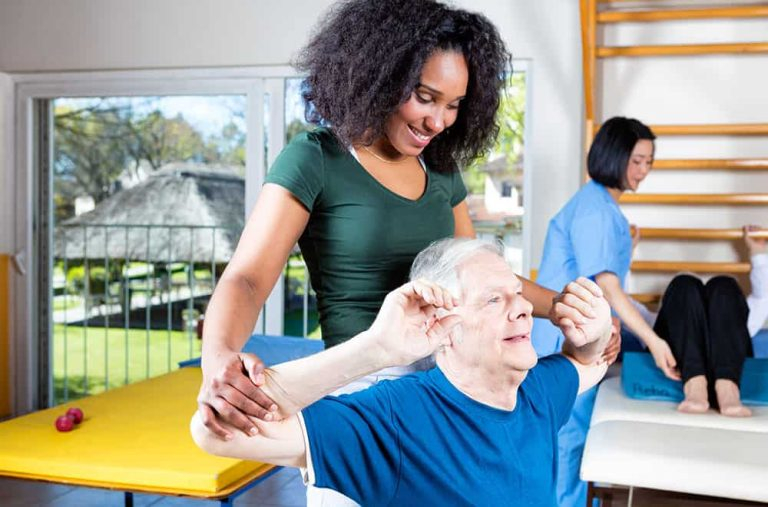One of the most common myths I encounter as an elbow and shoulder surgeon is that orthopaedic surgery is too risky for seniors, either due to their age, other medical problems, or a combination. Each week, I meet older patients in my office who have been told that they should not have their torn rotator cuff repaired or their arthritic joint replaced because of concerns of severe complications. Oftentimes, patients are told this by well-meaning family or friends—in some cases, even their doctor has inferred this. In this blog post, I want to debunk some of the misinformation around surgery as a senior—and provide options for those looking to live pain free, regardless of their age.
Surgery as a senior
An estimated 53 % of all surgical procedures in the US are performed on patients who are 65 years and older. However, there are special considerations to be taken into account. As a group, seniors tend to have more health concerns. For example, more seniors suffer from high blood pressure, diabetes, heart disease, and strokes than their younger counterparts. All of these create higher risk for surgery, partly due to the anesthesia required for major surgeries.
To be clear, surgical risk is more dependent on overall health than age. There are young people who might not be eligible for orthopaedic surgery due to extreme health risks, and there are very elderly patients who can tackle it without any major issues. Each person’s risk must be assessed on an individual basis.
The real concern: frailty

While age is a consideration in surgery eligibility for seniors, the real focus is on frailty. In medicine, frailty is a term used to describe people who are weak, tired, malnourished, struggling with complex medical problems, and do not tolerate medical and surgical interventions well. These individuals have the highest risk of falls, disability, extended hospital admission, or long-term care.
Arriving at a decision to avoid or pursue surgery may be a difficult decision for a frail patient and their family. The right answer may be to avoid surgery and instead pursue other treatments, such as cortisone injections, biologic injections, or physical therapy. However, if surgery is indicated as the best option for their shoulder or elbow condition, advanced awareness of a patient’s frailty and its associated risks will allow surgical teams to carefully plan their care, resulting in the best possible surgical outcome.
Of course, many elderly patients are not frail. In fact, I regularly do surgery on patients in their seventies, eighties, and occasionally in their nineties who are active and in good health. So, if you fall into this category, you may be interested to learn more about what surgery may look like for you.
What seniors can do before surgery
Get the facts
Before making a decision about surgery, senior patients should ask questions to weigh the potential risks and benefits. Below, you’ll find the questions I might ask if one of my own relatives required orthopaedic surgery. I encourage you to ask similar questions when considering surgery.
- What are the possible complications of this surgery?
- What is the average recovery time with this type of surgery?
- Do I have any health conditions that might complicate my surgery or recovery?
- What restrictions/limitations will I have post-surgery?
- What help will I need to care for myself after surgery?
- What are my treatment options if I choose not to have surgery?
- How will my condition change/deteriorate if I do not have surgery?
Commit to prehabilitation
A recent study shows that seniors benefit greatly from prehabilitation (prehab) before major surgery. Prehab is the pre-operative equivalent of rehabilitation and can include a nutritional supplement program and exercise regimen. The goal of prehab is to help seniors bounce back faster and with fewer complications. It can include:
- Walking;
- Core-strengthening exercises;
- Deep breathing;
- Discontinuing medications that can interact with anesthesia (such as antihistamines and benzodiazepines.)
- Eating more protein; and
- Drinking lots of fluids.
Making some small changes in the weeks before surgery will ensure you’re in better shape for surgery and set you up for a smoother recovery.
Research outpatient options
Outpatient surgery centers, also known as ambulatory surgery centers (ASCs), are healthcare facilities offering surgeries with same-day discharge to home. Although there are many advantages to having orthopaedic surgery in an ASC, not everyone is a good fit for surgery at an ASC. Until recently, only patients under the age of 70 were allowed to have surgery at an ASC. Now, healthy patients up to the age of 75-80 are accepted for orthopaedic surgical care in an ASC. Typically, the anesthesia team and lead medical officer make this decision for the ASC.
Unlike hospitals, ASCs do not have ICUs or cardiac, vascular, and pulmonary surgeons in-house to manage surgical complications. If a complication arises during surgery, a patient will be transferred to the nearest hospital. That is why patients who are considered at higher risk are only allowed to have surgery in hospitals. For senior patients who qualify, an ASC can offer a high-quality surgical experience that allows them to go home the same day.
Prepare to come home

Before heading in for surgery, all patients must ensure their home environment is conducive to postoperative healing. The last thing anyone wants is to land back in the hospital after surgery due to a preventable accident at home. This is especially true for seniors, who may already have balance or mobility issues before adding surgical recovery into the mix. A trip or fall after orthopaedic surgery is serious for anyone, but seniors need to be especially careful due to their higher risk of serious postoperative complications.
Take time before surgery to prevent additional injuries by doing a safety check. Common home safety modifications for elbow or shoulder surgery as a senior include:
- Installing a shower chair and grab bar in the bathroom;
- Removing any tripping hazards (eg. loose carpeting and electrical cords, etc.);
- Putting everyday items within reach (coffee cup, water glass, remote, telephone, etc.)
- Developing a routine with pets so that tripping over the animal is unlikely
After surgery
Showering & dressing
Depending on what type of surgery you have, you are likely to have reduced mobility for several days or weeks. You’ll also need to keep your affected arm dry—which means that if you shower or bathe after surgery, you should keep the surgical incisions covered with a waterproof or resistant cover. You may need help keeping the bandages and puncture sites dry by placing a plastic bag over the top of them, or replacing them with clean, dry ones if they get wet. Dressing yourself will be easier if you choose loose-fitting tops with a zipper up the front. Regardless, you will probably need help to get dressed at the beginning of your recovery.
Groceries and meals
Good food is an important part of recovery, but it can be hard to cook with one arm in a sling or brace. It’s not a good idea to only rely on simple meals like tea and toast, as these do not provide adequate nutrition for the important work of healing. Here’s what works for some of my patients:
- Preparing healthy meals before surgery and freezing individual portions;
- Signing up for food delivery services (eg. Meals on Wheels); and
- Purchasing healthy, frozen meals ahead of time that can be easily reheated.
- Enrolling in a nutritional supplement program that will provide added and essential protein, as well as vitamins and electrolytes.
Physical therapy
Physical therapy is a valuable part of the rehabilitation process. Seniors can work with a local physical therapist who can provide a personalized recovery plan for their needs. Find out more about the physical therapy process here and here.
The role of caregivers
Everyone needs support after having major surgery, and this is especially true for seniors. Here’s how caregivers can help their older loved ones get ready and recover from surgery:
- Help them prepare mentally by talking through their concerns and hopes for recovery;
- Encourage them to complete any pre-hab prescribed by their surgeon, including a nutritional support program;
- On the day of discharge, give them a ride home;
- Remove all tripping hazards at home; and
- Place needed items within reach.
Some seniors may be eligible for in-home care following surgery or they may choose to hire someone privately. Many in-home care agencies provide trained caregivers for a few hours or days per week to help seniors keep up with physical therapy, do some housekeeping, oversee medication management, etc.
I love working with all senior patients to make their orthopaedic surgery a success. I’ve had the privilege of working with a huge range of seniors — including an 80-year-old rock climber and a 90-year-old active lady who helps with her great-grandchildren — and I’m always inspired by their tenacity and determination.
If you have an elbow or shoulder issue, feel free to call for an appointment. I’d be happy to work together — regardless of your age — to get you back to an active life and regain as much mobility and use of your shoulder and elbow as possible.








